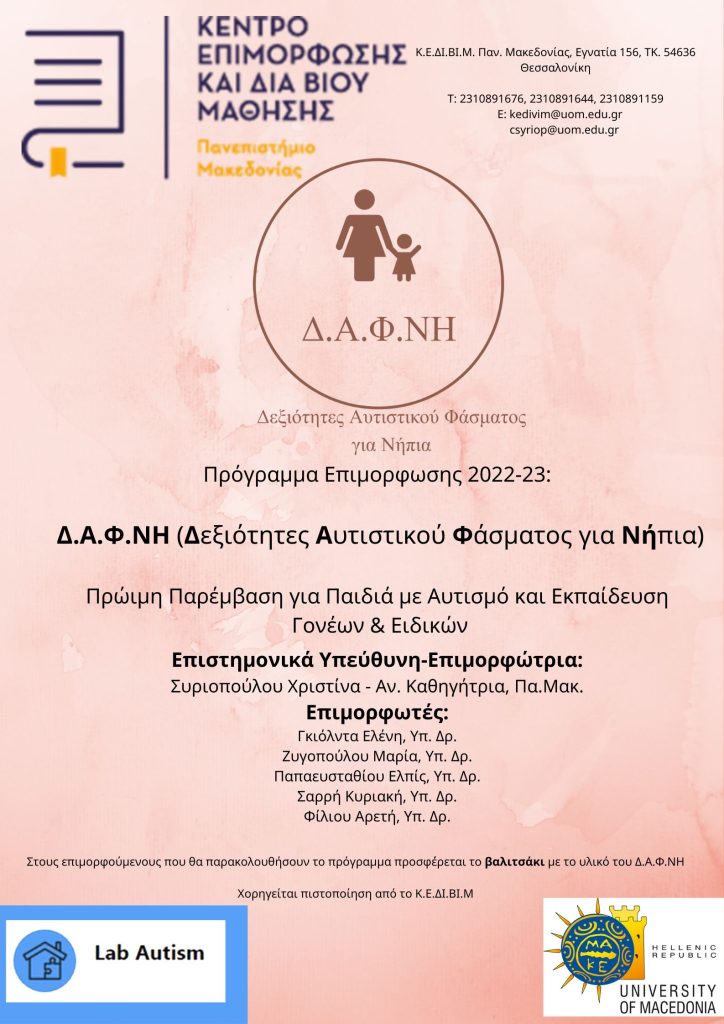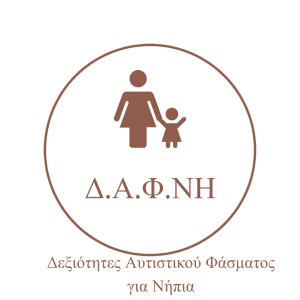CeLL

Daphne (Δ.Α.Φ.ΝΗ)-Early intervention program for toddlers and preschool children with ASD
Δ.Α.Φ.ΝΗ is an innovative and pioneering early intervention program for toddlers and preschool children with ASD from 0 to 6 years old. It was developed because of the lack of early intervention in Greece. It was, also, successfully implemented in a pilot study with spectacular results for preschool children with ASD. It can be used by parents and other family members for home teaching and specialists that work with preschool children with ASD or children at high risk for ASD.
The purpose of this specific program is to guide parents in order to teach their own children, focus on the most important developmental areas with long-lasting effects on their children, improve and strengthen the relationship and the communication with them and continue to support their children’s education.
Δ.Α.Φ.ΝΗ provides the opportunity to parents and professionals to teach skills from 6 different developmental areas. These skills were developed and based on the developmental milestones of typically developed children. The included developmental areas are:
- Social Skills
- Communication
- Self-help
- Behaviour Management
- Sleep Management
- Motor Skills

The teaching goals that are set for each child, are individualized according to their needs, abilities, and difficulties. They can, also, be altered according to each child’s progress.
Each one of the 6 developmental areas includes:
- a booklet with skills based on chronological age, the description of the skill with a step analysis, and useful tips for parents. The skill acquisition is based on the successful performance and the sequence of each step according to the description.
- a Checklist
- additional printed material
The program’s manual is also included in the kit.
The Early Intervention Program Δ.Α.Φ.ΝΗ was created and developed by the members of Lab Autism (Elpis Papaefstathiou, Maria Zygopoulou, Kyriaki Sarri, Eleni Gkiolnta and the participation of Areti-Eirini Filiou) of the University of Macedonia in the context of a research grant scheme.
(Copyright 2022)

Education of People with Autism, Use of Assistive Technology and Counselling Support
The Center for Lifelong Learning of University of Macedonia is offering a credit programme entitled “Education of People with Autism, Use of Assistive Technology and Counselling Support” with a duration of 460 hours, which is going to be implemented using asynchronous distance and synchronous distance (e-Learning) methods.
The programme is addressed to teachers, speech therapists, special educators, psychologists, social workers, sociologists, parents of children with autism spectrum disorders, doctors and paediatricians and specialists in various scientific fields who work or will work in general schools of primary and secondary education, in special schools, in Special Vocational Education and Training Workshops (ΕΕΕΚ) and in Centres of Educational and Counselling Support (KESY).
Purpose
Participants:
- will acquire theoretical knowledge
- will learn about education, support for people with autism and their family members
- will acquire practical knowledge on the implementation of educational programmes, management of behavioral outbursts, assessment of people with autism, alternative communication, as well as their social inclusion
- will acquire theoretical and practical knowledge on the use of software and assistive technology means for the development of skills in people with autism
- will gain access to the curriculum and familiarize with the adaptation of teaching objectives and the use of virtual environments
Learning objectives
The specialization in issues of:
- Education
- Evaluation
- Software & Hardware for training people with autism
- Incremental Communication and Skills Cultivation with the use of Assistive Technology means
- Teaching objectives, access to the curriculum using assistive technology tools
- Management of specific behaviors
- Counseling of parents and other family members of the person with autism
